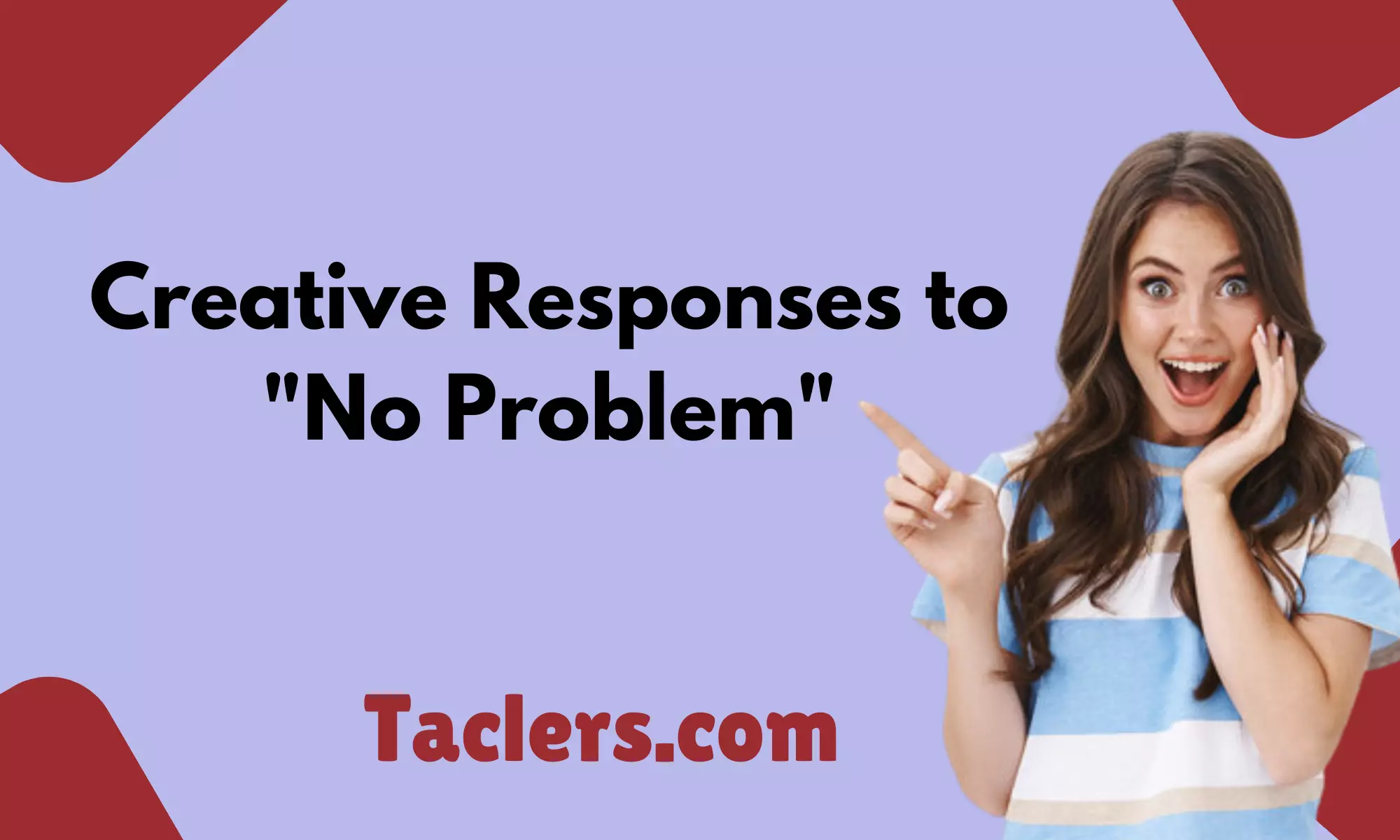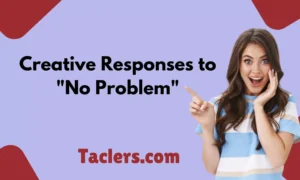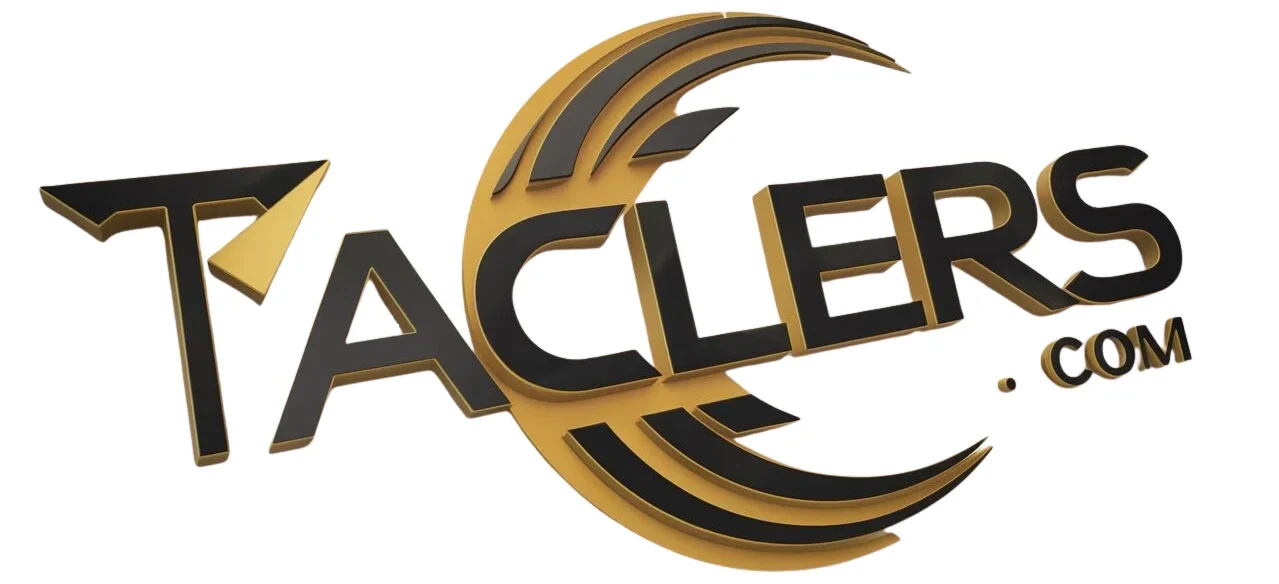The phrase “No problem” is often used as a casual way to acknowledge someone’s thanks or request. While it’s a common reply, sometimes you might want to mix things up with a more creative or meaningful response.
Whether you’re aiming to be polite, humorous, or thoughtful, here are 30 alternative replies to “No problem” that can add a bit of flair to your conversations.
1. “Glad to Help!”
Explanation:
This response shows that you were happy to assist.
Example:
Person A: “Thanks for the help!”
Person B: “Glad to help!”
By saying “Glad to help,” you express your willingness and positive attitude.
2. “Anytime!”
Explanation:
This reply lets the other person know you’re always available to assist.
Example:
Person A: “Thanks for covering my shift.”
Person B: “Anytime!”
By saying “Anytime,” you communicate your openness to help again in the future.
3. “My Pleasure”
Explanation:
This response adds a touch of formality and warmth to your reply.
Example:
Person A: “Thanks for picking me up.”
Person B: “My pleasure.”
By saying “My pleasure,” you convey that you genuinely enjoyed helping.
4. “No Worries!”
Explanation:
A casual and reassuring response that suggests it was no trouble at all.
Example:
Person A: “Sorry for the last-minute request.”
Person B: “No worries!”
By saying “No worries,” you downplay any inconvenience.
5. “Of Course!”
Explanation:
This reply emphasizes that your help was natural and expected.
Example:
Person A: “Thanks for the favor.”
Person B: “Of course!”
By saying “Of course,” you imply that it was a given you’d help.
6. “Happy to Do It”
Explanation:
Expresses that you were not only willing but happy to assist.
Example:
Person A: “I appreciate your assistance.”
Person B: “Happy to do it.”
By saying “Happy to do it,” you underline your positive feelings about helping.
7. “Absolutely!”
Explanation:
A strong, affirmative response that shows your enthusiasm.
Example:
Person A: “Thanks for lending me a hand.”
Person B: “Absolutely!”
By saying “Absolutely,” you confirm your support with enthusiasm.
8. “You Got It!”
Explanation:
A friendly and confident reply that suggests you’re always ready to help.
Example:
Person A: “Thanks for the help!”
Person B: “You got it!”
By saying “You got it,” you convey a sense of reliability.
9. “It Was Nothing”
Explanation:
Downplays the effort involved and keeps the tone light.
Example:
Person A: “Thanks for doing this for me.”
Person B: “It was nothing.”
By saying “It was nothing,” you modestly minimize your effort.
10. “Don’t Mention It”
Explanation:
Suggests that no thanks are necessary, emphasizing that the help was a given.
Example:
Person A: “I owe you one!”
Person B: “Don’t mention it.”
By saying “Don’t mention it,” you imply that your assistance required no thanks.
11. “Always Here to Help”
Explanation:
Reassures the other person that they can count on you anytime.
Example:
Person A: “Thanks for the help.”
Person B: “Always here to help.”
By saying “Always here to help,” you reinforce your availability.
12. “Consider It Done”
Explanation:
A proactive response that implies your commitment to the task.
Example:
Person A: “Thanks for taking care of that.”
Person B: “Consider it done.”
By saying “Consider it done,” you convey confidence and reliability.
13. “It Was My Duty”
Explanation:
A humble and responsible reply that suggests it was part of your role.
Example:
Person A: “Thanks for handling that.”
Person B: “It was my duty.”
By saying “My duty,” you emphasize your sense of responsibility.
14. “I’m Here for You”
Explanation:
This reply conveys that you’re supportive and dependable.
Example:
Person A: “Thanks for being there for me.”
Person B: “I’m here for you.”
By saying “Here for you,” you show your willingness to support them emotionally or practically.
15. “Just Doing My Part”
Explanation:
A modest response that downplays your help as simply fulfilling your role.
Example:
Person A: “Thanks for your help.”
Person B: “Just doing my part.”
By saying “Doing my part,” you express humility about your contribution.
16. “Glad I Could Assist”
Explanation:
Acknowledges your role in helping while maintaining a polite tone.
Example:
Person A: “Thanks for your support.”
Person B: “Glad I could assist.”
By saying “Glad I could assist,” you reflect on your helpfulness without being boastful.
17. “No Trouble at All”
Explanation:
Downplays any difficulty involved in providing help.
Example:
Person A: “I appreciate your time.”
Person B: “No trouble at all.”
By saying “No trouble at all,” you minimize the effort involved in helping.
18. “I Was Happy to Do It”
Explanation:
Expresses that helping brought you joy.
Example:
Person A: “Thanks for the assistance.”
Person B: “I was happy to do it.”
By saying “Happy to do it,” you emphasize your positive feelings about helping.
19. “Nothing to It”
Explanation:
A casual response that implies the task was easy.
Example:
Person A: “Thanks for helping out.”
Person B: “Nothing to it.”
By saying “Nothing to it,” you suggest the task was simple and not burdensome.
20. “All in a Day’s Work”
Explanation:
Implies that the task was part of your regular routine and not an inconvenience.
Example:
Person A: “Thanks for covering that.”
Person B: “All in a day’s work.”
By saying “All in a day’s work,” you downplay the effort as part of your normal duties.
21. “Not a Big Deal”
Explanation:
Minimizes the significance of the favor, making it seem less burdensome.
Example:
Person A: “I’m grateful for your help.”
Person B: “Not a big deal.”
By saying “Not a big deal,” you keep the tone light and casual.
22. “I’m Glad I Could Help Out”
Explanation:
Acknowledges your role in helping while expressing your satisfaction.
Example:
Person A: “Thanks for assisting me.”
Person B: “I’m glad I could help out.”
By saying “Glad I could help out,” you balance modesty with a touch of pride.
23. “No Thanks Necessary”
Explanation:
Suggests that thanks aren’t needed, as the help was a given.
Example:
Person A: “Thanks for your time.”
Person B: “No thanks necessary.”
By saying “No thanks necessary,” you imply that the help was natural and expected.
24. “I Was Just Doing What’s Right”
Explanation:
Expresses that your actions were simply the correct thing to do.
Example:
Person A: “Thank you for your help.”
Person B: “I was just doing what’s right.”
By saying “Doing what’s right,” you emphasize a strong sense of ethics.
25. “It’s What Friends Are For”
Explanation:
Highlights the importance of helping each other in friendships.
Example:
Person A: “Thanks for being there.”
Person B: “It’s what friends are for.”
By saying “What friends are for,” you underline the mutual support inherent in friendship.
26. “Just Lending a Hand”
Explanation:
A humble response that downplays your role as simply helping out.
Example:
Person A: “Thanks for your support.”
Person B: “Just lending a hand.”
By saying “Lending a hand,” you modestly describe your contribution.
27. “I’m Always Here If You Need Anything”
Explanation:
Expresses your ongoing availability and willingness to help in the future.
Example:
Person A: “Thanks for helping out.”
Person B: “I’m always here if you need anything.”
By saying “Always here,” you reassure them of your constant support.
28. “I Was Happy to Be of Service”
Explanation:
Adds a touch of formality and grace to your response.
Example:
Person A: “Thanks for your assistance.”
Person B: “I was happy to be of service.”
By saying “Happy to be of service,” you convey a polite and professional tone.
29. “It Was an Honor to Help”
Explanation:
Elevates the favor by expressing that helping was a privilege.
Example:
Person A: “Thanks for the favor.”
Person B: “It was an honor to help.”
By saying “Honor to help,” you show deep respect and gratitude for the opportunity.
30. “I’m Just Glad Everything Worked Out”
Explanation:
Focuses on the positive outcome rather than the effort.
Example:
Person A: “Thanks for your support.”
Person B: “I’m just glad everything worked out.”
By saying “Glad everything worked out,” you shift the focus to the successful result.

Ethan Richards, a distinguished writer at Taclers.com, excels in blending sharp insights with engaging storytelling. His background in sociology adds depth to his analysis of human reactions, making his articles both thought-provoking and entertaining. Explore the world of reactions with Ethan and see familiar moments in a whole new light.










